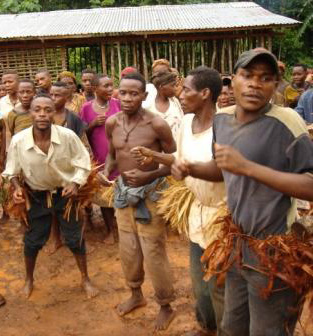Features December 3, 2011
The BaAka of Central Africa: Exclusive Singing Lesson Video & Much More!
In hopes of bringing you an extensive breadth of information on the BaAka pygmies beyond our radio program, below is a list of resources and videos on this fascinating tribe from Central Africa.
- Banning Eyre's Interview with Michelle Kisliuk: Check out Banning's interview with the ethnomusicology professor and scholar of our program
- Video of Michelle Kisliuk Teaching BaAka Singing: The professor teaches a group of novices how to sing like the BaAka!
More Links...
- Youtube Playlist on BaAka Pygmies via Afropop Worldwide's Youtube Channel handpicked by Michelle Kisliuk!
- Seize The Dance Material Page: A resourceful page to accompany Michelle Kisliuk's book with VIDEO + AUDIO.
- Pygmies.org - This site is dedicated primarily to original research of different pygmy groups in the Central African rainforest region. Original photos and field recordings are the work of anthropologist and ethnomusicologist Luis Devin.
- PBS: "Rainforest Music" - This is a brief break-down of elements of pygmy musical culture.
- Mbuti Tribes via Folkways - The sounds of the Mbuti tribe (Democratic Republic of Congo) are recorded by Colin Turnbull, who wrote The Forest People, a well-regarded ethnography. Michelle Kisliuk is also a major contributor to this collection, which is a favorite among ethnomusicologists.
- International Library of African Music - This is an online library of field recordings based in South Africa. Do some research!
- Smithsonian Magazine Special - Read this article published just last year about the plight of forest people in Central Africa, published in Smithsonian Magazine.
- 1heart.org - This organization aims to help the BaAka people of Cameroon benefit from their musical recordings by sending back royalties and executing the projects that they initiate. Check out their unique fundraising effort here.
- Batwa.org - This organization attempts to let the pygmy groups of the Democratic Republic of Congo define their own humanitarian assistance needs in the region.









